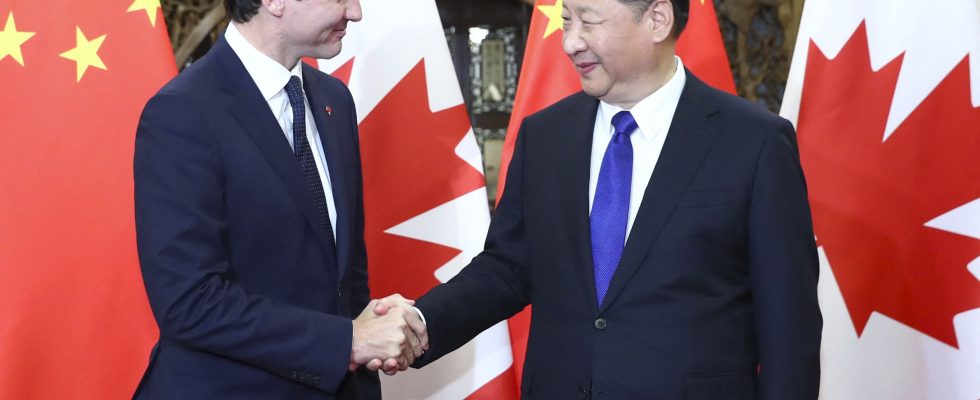Canada announced on Monday the expulsion of a Chinese diplomat, whom the country accused of having tried to intimidate a Canadian deputy opposed to Beijing. In retaliation, China decided on Tuesday, May 9, to send the Canadian consul back to Shanghai, marking a new episode in the already very tense relations for five years between the two powers.
What are the facts ?
“Persona non grata”. This is how Canadian Foreign Minister Mélanie Joly described diplomat Zhao Wei in a press release sent on Monday. “We will not tolerate any form of foreign interference in our internal affairs. Diplomats in Canada have been warned that if they engage in this type of behavior they will be sent home,” she warned. The official stationed at the Chinese consulate in Toronto should be expelled within five days, according to a source familiar with the matter consulted by AFP.
Ottawa in fact accuses him of having tried to exert pressure on the Canadian conservative parliamentarian Michael Chong and his family, because of his critical position towards Beijing, in particular on the subject of the Uyghurs.
In retaliation, the Foreign Ministry in Beijing also declared the Canadian consul in Shanghai, Jennifer Lynn Lalonde, “persona non grata”. In a statement posted online, she was “invited to leave China by May 13”. “China reserves the right to react further,” Beijing added.
What is the context?
This case is in line with the deterioration of relations between the two countries, which began in 2018 with the arrest by Canada, at the request of the United States, of Meng Wanzhou, the financial director and heiress of Huawei, the Chinese telecom and smartphone giant. She then risked extradition to the United States on charges of bank fraud and circumventing American sanctions against Iran.
A few days after Ottawa got hold of the head of Huawei, Beijing arrested two Canadian nationals in China. Businessman Michael Spavor and former diplomat Michael Kovrig will spend more than 1,000 days in prison before an agreement between the Huawei executive and US justice releases them along with Meng Wanzhou. She pleads not guilty, while acknowledging “false statements”. After being under house arrest for three years, the daughter of the boss of the Huawei empire finally takes over the presidency of the group.
But after these long years of “hostage diplomacy”, the situation is once again tense around Canada’s criticism of China over its treatment of the Muslim Uyghur minority. The Canadian Parliament successively adopts in 2021 a motion recognizing Uyghur “genocide” in China – an act that Beijing describes as “malicious provocation” – then last February, a motion to welcome 10,000 Uyghur refugees who fled China.
In May 2022, the Canadian government announced that it was banning Huawei and ZTE from the deployment of its 5G network because, in its view, Chinese equipment manufacturers represented a risk to the country’s security. It is then the turn of the TikTok application to be banned for the same reasons on the devices of Canadian officials, just as it was already the case for the personnel of the United States and the European Commission.
At the G20 last year, Chinese President Xi Jinping was also quick to publicly rebuke his Canadian counterpart Justin Trudeau, accusing him of leaking information about their private meeting to the press. China later accused Canada of being “condescending”.
Why is this important?
The issue of Chinese interference in the last Canadian federal election was already front and center in Canada, with Prime Minister Justin Trudeau appointing an independent special rapporteur last March to investigate allegations of Chinese interference in the last two federal elections of 2019 and 2021.
The daily The Globe and Mail released a report that claimed the government had turned a blind eye to Beijing’s interference in Canadian affairs. In particular, he mentioned the attempts to intimidate MP Michael Chong, which were “very certainly intended to make this MP an example and to dissuade other MPs from adopting positions hostile” to China, according to a document from the Service. Canadian Security Intelligence (CSIS) revealed by the newspaper.
Beijing has since spoken out against the decision to expel its diplomat, accusing Canada of having “sabotaged” the already very tense relations, and calling on it to stop its “unjustified provocations”. Already last week, the Chinese ambassador spoke of “slander” and “defamation” of Canada.
“We decided that we had to send a very clear message: we will not accept foreign interference and, whatever the next choices they make, we will not be intimidated”, has since replica Justin Trudeau.
